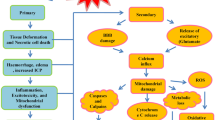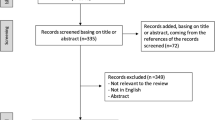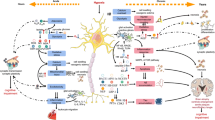Abstract
Background
A rat model for neonatal hypoxic-ischemic brain damage (HIBD) was established to observe the effect of ischemic postconditioning (IPostC) on cerebral edema and the AQP4 expression following HIBD and to verify the neuroprotection of IPostC and the relationship between changes of AQP4 expression and cerebral edema.
Methods
Water content was measured with dry-wet method, and AQP4 transcription and the protein expression of the lesions were detected with real-time PCR and immunohistochemistry staining, respectively.
Results
Within 6–48 hours, the degree of ipsilateral cerebral edema was significantly lower in IPostC-15 s/15 s group than in HIBD group. Similar to the HIBD group, the AQP4 transcription and expression in the IPostC group showed a downward and then upward trend. But the expression was still more evident in the HIBD group than in the IPostC-15 s/15 s group. From 24 to 48 hours, IPostC-15 s/15 s decreased the slowing down expression of AQP4.
Conclusion
IPostC has neuroprotective effect on neonatal rats with HIBD and it may relieve cerebral edema by regulating the expression of AQP4.
Similar content being viewed by others
References
Fu X, Li Q, Feng Z, Mu D. The roles of aquaporin-4 in brain edema following neonatal hypoxia ischemia and reoxygenation in a cultured rat astrocyte model. Glia 2007;55:935–941.
Nijboer CH, van der Kooij MA, van Bel F, Ohl F, Heijnen CJ, Kavelaars A. Inhibition of the JNK/AP-1 pathway reduces neuronal death and improves behavioral outcome after neonatal hypoxic-ischemic brain injury. Brain Behav Immun 2010;24:812–821.
Saadoun S, Papadopoulos MC. Aquaporin-4 in brain and spinal cord oedema. Neuroscience 2010;168:1036–1046.
Zhao H, Sapolsky RM, Steinberg GK. Interrupting reperfusion as a stroke therapy: ischemic postconditioning reduces infarct size after focal ischemia in rats. J Cereb Blood Flow Metab 2006;26:1114–1121.
Jiang X, Shi E, Nakajima Y, Sato S. Postconditioning, a series of brief interruptions of early reperfusion, prevents neurologic injury after spinal cord ischemia. Ann Surg 2006;244:148–153.
Yang F, Zhang X, Sun Y, Wang B, Zhou C, Luo Y, et al. Ischemic postconditioning decreases cerebral edema and brain blood barrier disruption caused by relief of carotid stenosis in a rat model of cerebral hypoperfusion. PLoS One 2013;8:e57869.
Liu XR, Luo M, Yan F, Zhang CC, Li SJ, Zhao HP, et al. Ischemic postconditioning diminishes matrix metalloproteinase 9 expression and attenuates loss of the extracellular matrix proteins in rats following middle cerebral artery occlusion and reperfusion. CNS Neurosci Ther 2012;18:855–863.
Xing B, Chen H, Zhang M, Zhao D, Jiang R, Liu X, et al. Ischemic postconditioning inhibits apoptosis after focal cerebral ischemia/reperfusion injury in the rat. Stroke 2008;39:2362–2369.
Wang JY, Shen J, Gao Q, Ye ZG, Yang SY, Liang HW, et al. Ischemic postconditioning protects against global cerebral ischemia/reperfusion-induced injury in rats. Stroke 2008;39:983–990.
Joo SP, Xie W, Xiong X, Xu B, Zhao H. Ischemic postconditioning protects against focal cerebral ischemia by inhibiting brain inflammation while attenuating peripheral lymphopenia in mice. Neuroscience 2013;243:149–157.
Kong Y, Rogers MR, Qin X. Effective neuroprotection by ischemic postconditioning is associated with a decreased expression of RGMa and inflammation mediators in ischemic rats. Neurochem Res 2013;38:815–825.
Ribeiro Mde C, Hirt L, Bogousslavsky J, Regli L, Badaut J. Time course of aquaporin expression after transient focal cerebral ischemia in mice. J Neurosci Res 2006;83:1231–1240.
Frydenlund DS, Bhardwaj A, Otsuka T, Mylonakou MN, Yasumura T, Davidson KG, et al. Temporary loss of perivascular aquaporin-4 in neocortex after transient middle cerebral artery occlusion in mice. Proc Natl Acad Sci U S A 2006;103:13532–13536.
Papadopoulos MC, Verkman AS. Aquaporin-4 and brain edema. Pediatr Nephrol 2007;22:778–784.
Gao X, Zhang H, Takahashi T, Hsieh J, Liao J, Steinberg GK, et al. The Akt signaling pathway contributes to postconditioning’s protection against stroke; the protection is associated with the MAPK and PKC pathways. J Neurochem 2008;105:943–955.
Ren C, Gao X, Niu G, Yan Z, Chen X, Zhao H. Delayed postconditioning protects against focal ischemic brain injury in rats. PLoS One 2008;3:e3851.
Tan X, Zhang L, Jiang Y, Yang Y, Zhang W, Li Y, et al. Postconditioning ameliorates mitochondrial DNA damage and deletion after renal ischemic injury. Nephrol Dial Transplant 2013;28:2754–2765.
Kaur S, Jaggi AS, Singh N. Molecular aspects of ischaemic postconditioning. Fundam Clin Pharmacol 2009;23:521–536.
Pignataro G, Scorziello A, Di Renzo G, Annunziato L. Postischemic brain damage: effect of ischemic preconditioning and postconditioning and identification of potential candidates for stroke therapy. FEBS J 2009;276:46–57.
Zelenina M. Regulation of brain aquaporins. Neurochem Int 2010;57:468–488.
Author information
Authors and Affiliations
Corresponding author
Rights and permissions
About this article
Cite this article
Yu, L., Fan, SJ., Liu, L. et al. Effect of ischemic postconditioning on cerebral edema and the AQP4 expression following hypoxic-eschemic brain damage in neonatal rats. World J Pediatr 11, 165–170 (2015). https://doi.org/10.1007/s12519-014-0519-4
Received:
Accepted:
Published:
Issue Date:
DOI: https://doi.org/10.1007/s12519-014-0519-4




